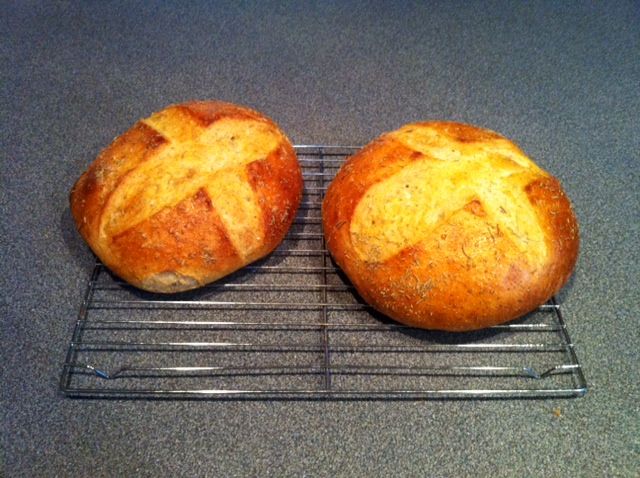Still a newbie with this baking but really enjoying the journey. I used a King Arthur Sourdough recipe for a pretty basic sourdough loaf....a bit of instant yeast and 8 oz of my starter. Everything seems to work fine however when I score the loaf after the second proofing the end result seems to be quite wide. I'd like to achieve a more narrow cut and a bit more crusty.

then I use some kind of Dutch oven or Sylvia's steaming pans. The steam will put a crusty well browned crust on bread like nothing else along with baking at 450 F until 205 F on the inside.
Happy baking
but your loaf might be underproofed. That's been my guess when that happens. Patrick
Thanks....I'll test further to try and get the proofing right next time.
A wide bloom after baking is often desirable and a sought-after characteristic. What it sounds like you are saying (but please clarify) is that when you score the loaf prior to baking, the dough spreads out widening the score. If this is the case, then a couple of things may be happening. It's possible that your gluten is insufficiently developed and cannot hold the structure, especially if you have a very high hydration dough (over 72% or so). You may also be overproofing and the proteins are being broken down by enzymes, which also would contribute to the loss of structure. Tell us a bit more about your recipe and process.
-Brad
Pretty basic recipe..
8oz of my starter, 2 tsp instant yeast, 12oz water, bit of sugar and salt and 21.25 oz of flour (I used 18 oz of bread flour and 3.25 oz of WW)
Mixed and kneaded until smooth etc then left to proof until doubled. I then punched it down, cut it in half and then formed two balls and a further hour for the second proofing. It increased in size again and then I scored it with a knife and brushed an egg yolk.h2O mixture. Oven at 425F for a total of 30 minutes (turning at 20 minutes for equal browning etc.
Using 2 tsp on top of all that starter, it is very likely that you are overproofed. Most recipes use either starter or yeast. If both are called for, then the amount of yeast is decreased. 2 tsp of yeast is about 8-10 gms and 21.25 gm of flour is approximately 600 gm. A typical recipe for a straight baguette dough (i.e. without levain) may call for about 1% instant yeast, which is 6 gm based on the flour in your recipe. Since the instant yeast has much higher activity than the yeasts in a levain, you probably are getting little to no rise boost from the starter, although you may get some flavor enhancement. Search the TFL site for some recipes for breads to your taste and compare yours to it.
-Brad.